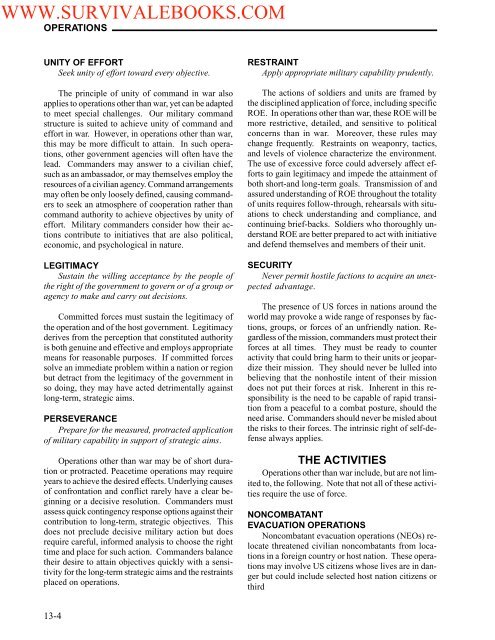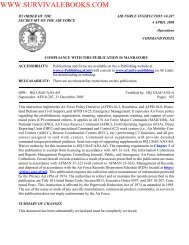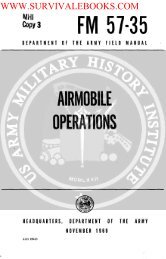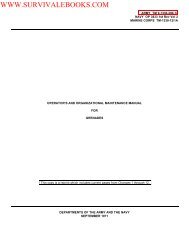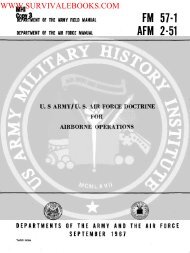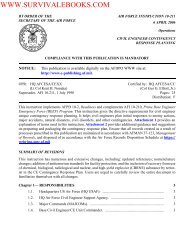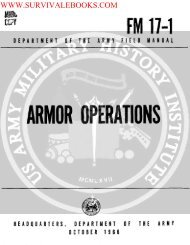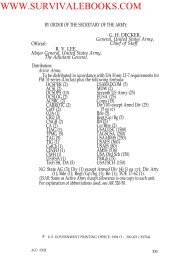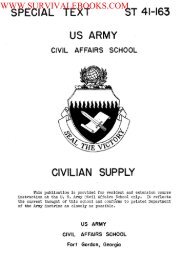FM 100-5 Operations - Survival Ebooks Military Manuals Survival ...
FM 100-5 Operations - Survival Ebooks Military Manuals Survival ...
FM 100-5 Operations - Survival Ebooks Military Manuals Survival ...
Create successful ePaper yourself
Turn your PDF publications into a flip-book with our unique Google optimized e-Paper software.
WWW.SURVIVALEBOOKS.COMOPERATIONSUNITY OF EFFORTSeek unity of effort toward every objective.The principle of unity of command in war alsoapplies to operations other than war, yet can be adaptedto meet special challenges. Our military commandstructure is suited to achieve unity of command andeffort in war. However, in operations other than war,this may be more difficult to attain. In such operations,other government agencies will often have thelead. Commanders may answer to a civilian chief,such as an ambassador, or may themselves employ theresources of a civilian agency. Command arrangementsmay often be only loosely defined, causing commandersto seek an atmosphere of cooperation rather thancommand authority to achieve objectives by unity ofeffort. <strong>Military</strong> commanders consider how their actionscontribute to initiatives that are also political,economic, and psychological in nature.LEGITIMACYSustain the willing acceptance by the people ofthe right of the government to govern or of a group oragency to make and carry out decisions.Committed forces must sustain the legitimacy ofthe operation and of the host government. Legitimacyderives from the perception that constituted authorityis both genuine and effective and employs appropriatemeans for reasonable purposes. If committed forcessolve an immediate problem within a nation or regionbut detract from the legitimacy of the government inso doing, they may have acted detrimentally againstlong-term, strategic aims.PERSEVERANCEPrepare for the measured, protracted applicationof military capability in support of strategic aims.<strong>Operations</strong> other than war may be of short durationor protracted. Peacetime operations may requireyears to achieve the desired effects. Underlying causesof confrontation and conflict rarely have a clear beginningor a decisive resolution. Commanders mustassess quick contingency response options against theircontribution to long-term, strategic objectives. Thisdoes not preclude decisive military action but doesrequire careful, informed analysis to choose the righttime and place for such action. Commanders balancetheir desire to attain objectives quickly with a sensitivityfor the long-term strategic aims and the restraintsplaced on operations.RESTRAINTApply appropriate military capability prudently.The actions of soldiers and units are framed bythe disciplined application of force, including specificROE. In operations other than war, these ROE will bemore restrictive, detailed, and sensitive to politicalconcerns than in war. Moreover, these rules maychange frequently. Restraints on weaponry, tactics,and levels of violence characterize the environment.The use of excessive force could adversely affect effortsto gain legitimacy and impede the attainment ofboth short-and long-term goals. Transmission of andassured understanding of ROE throughout the totalityof units requires follow-through, rehearsals with situationsto check understanding and compliance, andcontinuing brief-backs. Soldiers who thoroughly understandROE are better prepared to act with initiativeand defend themselves and members of their unit.SECURITYNever permit hostile factions to acquire an unexpectedadvantage.The presence of US forces in nations around theworld may provoke a wide range of responses by factions,groups, or forces of an unfriendly nation. Regardlessof the mission, commanders must protect theirforces at all times. They must be ready to counteractivity that could bring harm to their units or jeopardizetheir mission. They should never be lulled intobelieving that the nonhostile intent of their missiondoes not put their forces at risk. Inherent in this responsibilityis the need to be capable of rapid transitionfrom a peaceful to a combat posture, should theneed arise. Commanders should never be misled aboutthe risks to their forces. The intrinsic right of self-defensealways applies.THE ACTIVITIES<strong>Operations</strong> other than war include, but are not limitedto, the following. Note that not all of these activitiesrequire the use of force.NONCOMBATANTEVACUATION OPERATIONSNoncombatant evacuation operations (NEOs) relocatethreatened civilian noncombatants from locationsin a foreign country or host nation. These operationsmay involve US citizens whose lives are in dangerbut could include selected host nation citizens orthird13-4


